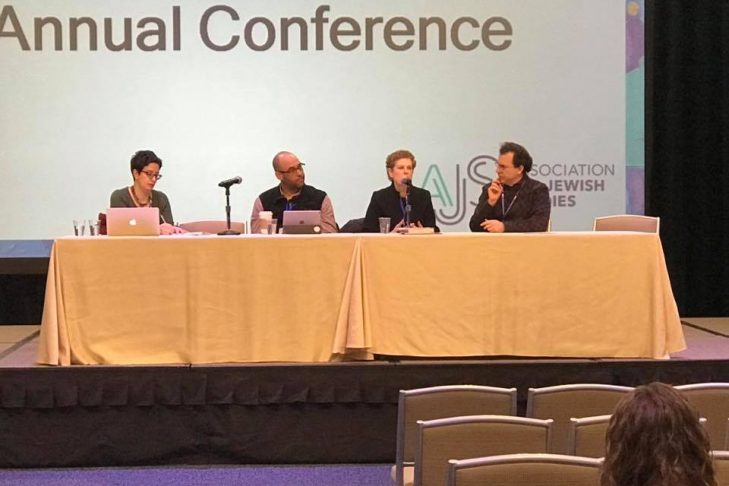Founded in December 1968 with a handful of scholars that barely filled the Brandeis University Faculty Club, the Association for Jewish Studies (AJS) has grown to over 2,000 members who represent 26 countries. That demonstration of diversity and progress was on display last week at Boston’s Seaport Hotel & World Trade Center—at any given time during the 50th American Jewish Studies Conference, there were 19 concurrent sessions, with 215 sessions overall. The numbers tell the story of the meeting’s growth, in which AJS sponsored over 850 speakers during the conference and now has over 20 different academic divisions.
Warren Hoffman, AJS executive director, told JewishBoston that celebrating AJS’s 50th anniversary in Boston felt like a homecoming. Over the past 50 years, AJS has become the largest academic Jewish association in the world. He pointed to the fact that the conference has continued to expand within the field of Jewish studies. “We’re resolutely looking toward the future,” he said. “We’ve rebranded ourselves with a new look and created core values. There are new task forces that serve our members in different ways. We’re asking ourselves how we can better serve the community. All of these changes are captured in our new tagline, ‘Fifty and Forward.’”
AJS has also launched a new podcast series called “Adventures in Jewish Studies,” which presents the lighter and more popular aspects of the field. The first podcast is a delightful romp through the history of appetizing and features Mark Russ Federman, third-generation proprietor of Russ & Daughters, as well as Hasia Diner, a professor of American Jewish history at New York University.
A paper on the AJS website presenting the history of Jewish studies and the group’s raison d’etre noted that its “growth was the result of the postwar expansion in university course offerings and the 1960s proliferation of area studies, which also included African American, Latin American and Asian American studies. Yet the case of Jewish studies was unique: It had a long academic tradition behind it and had already reached a high level of sophistication by the 1960s.”
The paper further noted that the advent of the Women’s Caucus founded within AJS in 1986 changed the “nature” of AJS and Jewish studies. A number of AJS women members in 1986 noted “the differentiated status of women in the field and the scarcity of women in the AJS leadership.” Among the changes the caucus affected was the introduction of women’s studies into Jewish studies. To further underscore the sea change in women’s membership in AJS, for a 1978-79 membership survey, only 114 of the 708 respondents were women. Thirty years later, that same survey found that AJS had achieved nearly equal gender parity.
A number of sessions at the conference embraced women’s issues. A session on “Reshaping American Jewish Womanhood: How #MeToo Renewal and Lilith Inform Gender, Identity and the Body” featured two Boston-area scholars on the subject. Keren McGinity, director of the interfaith families Jewish engagement program at Hebrew College and one of the Forward 50 2018 for inaugurating a Jewish response to sexual harassment, spoke about “The Meaning of Being Single Jewish Women in America, 1976-Present.” McGinity called on scholarly and communal support for single women. She noted that divorced Jewish women suffer from a kind of “social leprosy and have been marginalized the same way interfaith couples were in the 1950s.”
Judith Rosenbaum, executive director of the Boston-based Jewish Women’s Archive, reported on JWA’s expanding #MeToo archive. JWA put out a call last year for women to tell their #MeToo experiences. The stories that poured in tapped into a previously unexpressed fury. However, Rosenbaum also noted that there was a tendency among the respondents to minimize their stories.
Lisa Fishbayn Joffe, director of the Hadassah-Brandeis Institute, moderated a “Roundtable Discussion on Feminism, Anti-Semitism and Anti-Zionism.” Boston-area participants included Rosenbaum, Joyce Antler of Brandeis University and Debra Renee Kaufman of Northeastern University. The women addressed an overflowing crowd.
Although Sephardic and Mizrahi studies have seen a recent boon, a session entitled “Jewry’s Stepchildren? Sephardic and Mizrahi Jews and the Boundaries of Modern Jewish History” addressed the issue of Sephardic identity and ushering Sephardic and Mizrahi studies into the mainstream.
Other sessions showcased inclusion in Jewish life, as well as new strategies in pedagogy and the trailblazing work of the digital humanities. Winners of the 2018 Jordan Schnitzer Book Awards, funded by the Harold & Arlene Schnitzer Family Fund, included books on the reinvention of animal sacrifice in rabbinic literature, a material history of the Jewish Bible, Polish Jews and the rise of right-wing Zionism and Jewish conversion in Israel.
Hoffman noted that his organization is “undergoing exciting changes to be more embracing, inclusive and welcoming. We’re addressing the needs facing academia, as well as the needs of members facing challenges of not getting tenure. Diversity and inclusion for us include gender diversity, sexual orientation diversity as well as subject-matter diversity of other fields that don’t get as much airtime. We’re not just American and not just Ashkenazi. There are a lot of people doing great work, and we have to remember to widen the discourse of who is included.”



